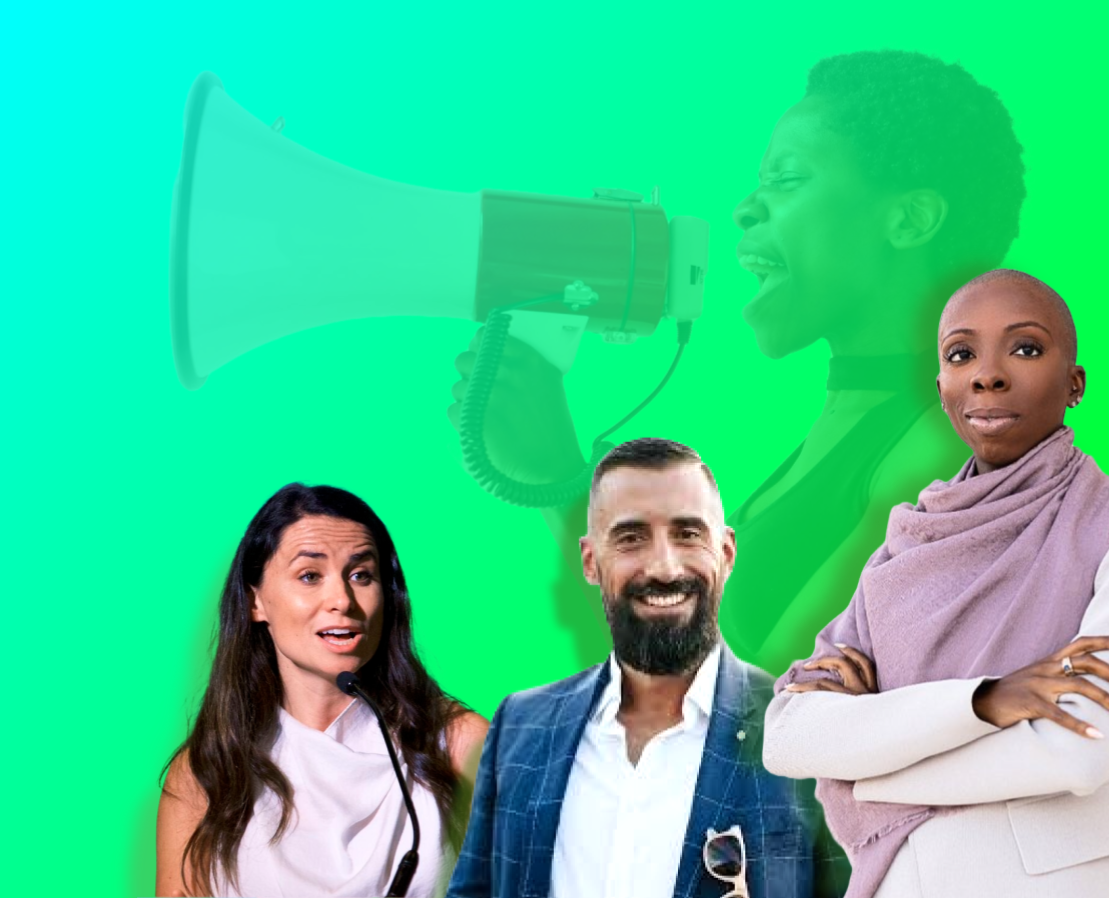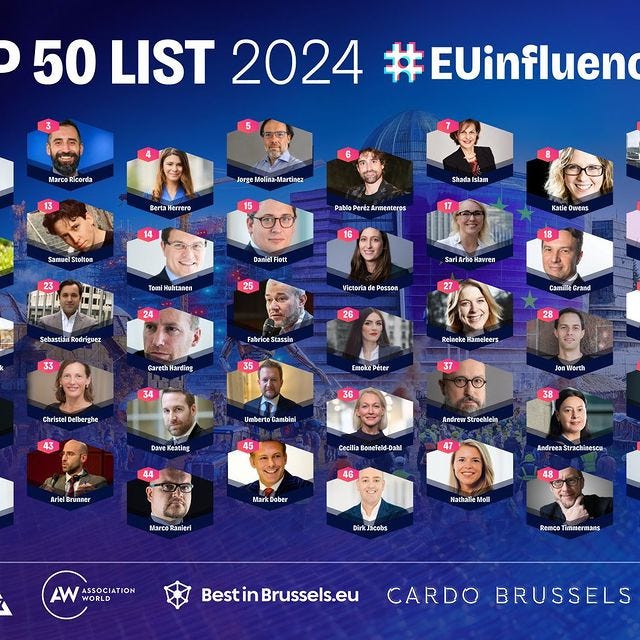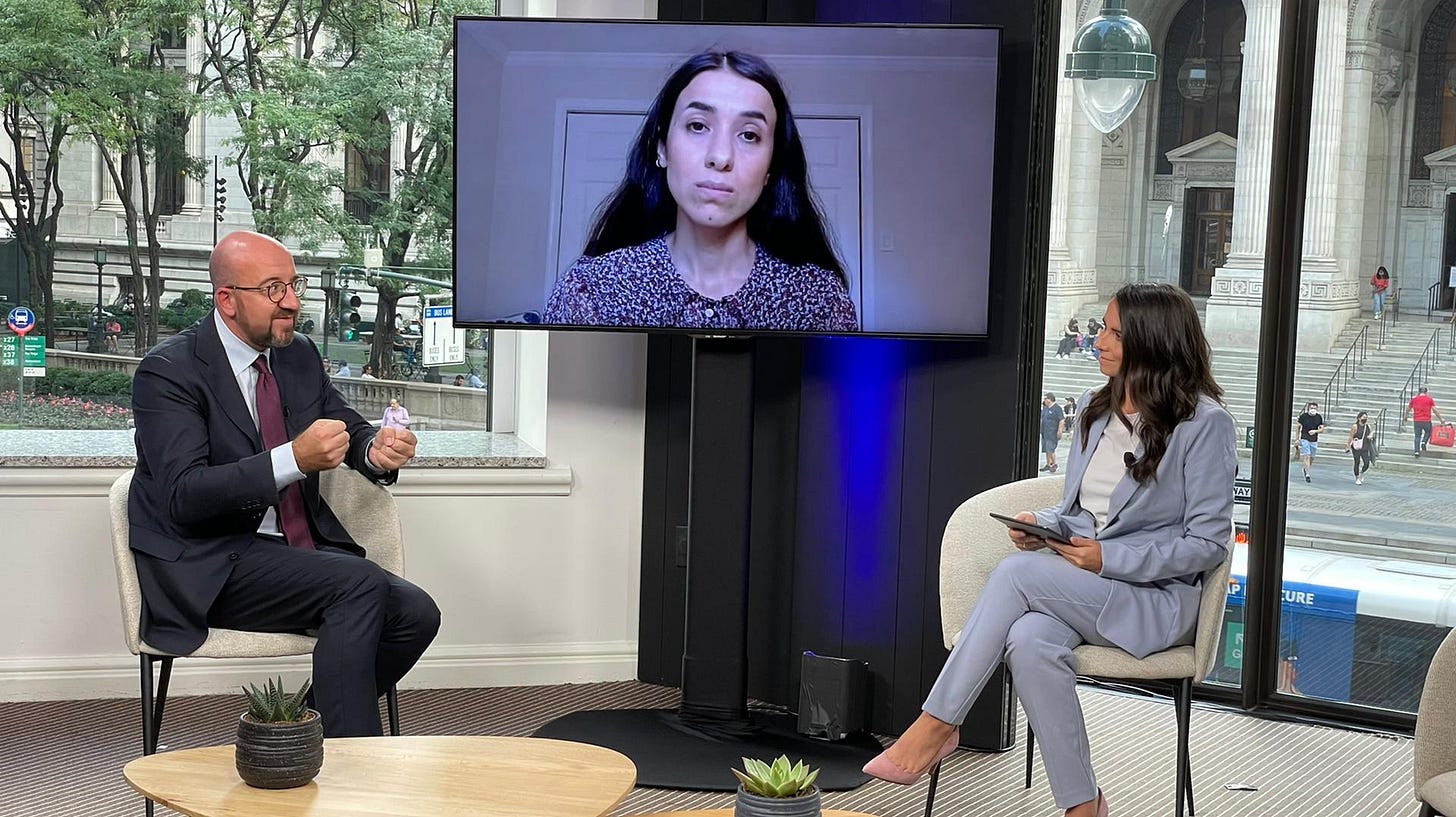Part 2 — What are the digital trends for politics and diplomacy?
After Gerry Diaz Bartolome, Anja Gabriel, and Alessandro Tommasi last week, we now spoke with Marco Ricorda, Stéphanie Fillion, and Roxy Ndebumadu for 2025 digital trends.
💬 CONVERSATION STARTERS this week:
As we continue to look into current trends and predictions for 2025, we spoke to more digital leaders, experts, and practitioners — for Part 2, Marco Ricorda, Stéphanie Fillion, and Roxy Ndebumadu — to better understand how the digital age is impacting politics and diplomacy.
If you missed Part 1 with Gerry Diaz Bartolome, Anja Gabriel, and
, click here:This and last week’s Substacks are part of a new series. If you have questions or experts in mind, please let us know.
And stay tuned for Part 3!
Marco Ricorda: “Digital diplomacy will become even more interactive and personalized”
* Marco Ricorda is a communication manager and analyst operating in the field of international relations and operations. He served the European Commission and Parliament, the ICMPD and Bruegel and has been nominated as one of the most influenctial LinkedIn profiles in EU affairs by ZN Consulting. Disclaimer: He speaks in a personal capacity with no reference to his current employment.
1. How do you balance transparency and sensitivity when communicating complex policies?
With regards to modern international communication operations, my approach is based on defrag and simplifying messages without compromising the integrity of the content. I find it very useful to break down complex policies into digestible pieces adapted to target audiences, while making sure the public understands the context and long-term impact. Some people just need a sentence, other will need more context. Regardless, I prefer “brutal simplicity of though” to “information overload”, which in the policy making field can be an unfortunate trend. As I get older, I tend to focus more on sensitivity - people's concerns, emotions, perceptions and narratives – as a fundamental to be factored in. Transparency builds trust, but sensitivity ensures that trust isn't broken by appearing tone-deaf or dismissive of real concerns.
2. Can digital diplomacy rebuild trust with audiences that are disillusioned by polarized narratives?
Yes. Digital diplomacy is one of the most powerful tools we have. The key is authenticity and engagement. Rather than pushing one-way communication, digital diplomacy must foster dialogue, allowing citizens and stakeholders to feel heard and understood. Engaging directly with disillusioned audiences in a respectful, transparent way can rebuild trust by addressing their concerns head-on without overpromising the impossible. Countering disinformation with facts isn’t enough as debunking is often ineffective. International communications managers must offer relatable narratives that resonate emotionally, showing that the institution or business they represent is listening and responding to real issues that concern the highest number of people, instead of the perception of a few well-connected.
3. What are your predictions for digital diplomacy next year and beyond?
I believe digital diplomacy will become even more interactive and personalized. We’ll see greater use of AI-driven engagement to create tailored but less relatable communication experiences (which will be a problem) where audiences receive content that is highly appealing to their context and interests. There will also be a significant rise in the use of data analytics to monitor sentiment in real-time, allowing for quicker adjustments to communication strategies. This is at risk of further polarization because of an ever stronger and relatable experiences through online behaviour-tailored algorithms. Beyond that, I expect digital diplomacy to become more driven by immersive but ephemeral experiences like augmented reality and interactive platforms that bring policies to life.
Stéphanie Fillion: “Social media have reduced the reliance on legacy media”
* Stéphanie Fillion is an award-winning reporter specializing in foreign affairs and a United Nations correspondent based in New York City. She is a regular contributor to Forbes Women, and her work appeared in outlets like Foreign Policy, CNN, Politico, and CBC/Radio-Canada. She is originally from Canada and writes in French, English, and Italian.
1) What is your stance in the debate regarding legacy media v the role of social media creators?
On the one hand, I believe the two should be treated as having completely different roles in society. Legacy media have developed, throughout decades of work, editorial standards processes that protect the readers, help them disseminate information, and ultimately are an integral part of a healthy democracy.
On the other hand, content creators have opened up a whole new world of information gathering and dissemination, and this shouldn't be underestimated. There are market forces (both for private companies and governments) that incentivize organizations to work more closely with content creators rather than legacy media, as, very often, there is less risk and more rewards to work with content creators.
That being said, it is good that legacy media and content creators interact with each other because legacy media have a lot to learn, mostly from a business perspective, from the creative side. I also think content creators can learn from legacy media in terms of handling information responsibility.
2) How has technology and social media changed the United Nations and the way the organization communicates?
It has provided more direct communication channels between the UN and the people it serves. As such, the UN can now use social media and new technologies to talk to the people they both help and interested citizens more directly.
That being said, and this is true for both the UN and governments, social media have reduced the reliance on legacy media to communicate with their audience, and ultimately, the erosion of legacy media will mean less accountability for these organizations.
Also, new technologies and social media have brought increasing challenges when it comes to disinformation and misinformation, and that is something that organizations like the UN have to address and debunk regularly
3) Any prediction for 2025 in terms of digital diplomacy and technology for diplomacy?
I would love to see more content from digital creators at the UN, and the organization itself opens its doors more to such initiatives -- I believe there is room for that.
Artificial intelligence will continue to be part of the challenges and opportunities in that space, and my hope is to see better regulations to help prevent the use of AI for misinformation and disinformation purposes.
Finally, and unfortunately, I believe the trust in institutions and legacy media will continue to decrease, and current trends in the US and abroad point in that direction and bad actors can benefit from it.


Roxy Ndebumadu: “Only by engaging in challenging yet necessary conversations can we begin to lay the groundwork for genuine reform.”
* Roxy Ndebumadu is a tech and political leader with past experience in pivotal roles at Microsoft, Amazon, and Twitch. She’s recognized for her groundbreaking work in ethical AI, government technologies modernization, and assessing the impacts of customer experience and online harms on consumer behavior. As an elected official, angel investor, and technology visionary, she is reshaping the innovation landscape globally.
1) How can government, elected officials, civil society, and the tech community work better together to rebuild trust in politics and diplomacy today?
Each of these groups currently operates as micro-communities, focused on narrow areas of alignment. To rebuild trust in politics, we must first recognize that many current practices have contributed to the erosion of public confidence, shaping the current landscape of political disengagement and alternative participation.
We now live in an era where government officials at times discourage civic expression, casting judgment on those who choose to support evolving candidates and, in doing so, undermining the very agency upon which America was founded. It is essential to acknowledge that the democracy we have today is an outcome of past actions by these groups.
To transform this dynamic and foster trust within our constituencies, we need to come together with a clear-eyed understanding of our society’s current state. Only by engaging in challenging yet necessary conversations can we begin to lay the groundwork for genuine reform. When we take these steps, true diplomacy will naturally follow.
2) Your main takeaways about the role of tech, artificial intelligence, and generative AI in this 2024 global election super-cycle with over 70 countries going to the polls?
My primary reflection on the role of technology, AI, and generative AI shouldn’t necessarily be my main takeaway, yet it undeniably dominates the surface. Disinformation continues to shape our elections in increasingly sophisticated ways, fueling an urgent nationwide discourse on regulating emerging technologies. Unfortunately, meaningful regulatory action on these technologies did not materialize as a core issue in this year’s U.S. election—an omission that reveals how leaders are still skirting around what is, without question, a critical issue. This avoidance underscores the pressing need for new standards or reforms, as our technological landscape rapidly advances, reshaping democratic processes and public trust.
3) Your predictions for the role of tech, politics, and diplomacy in 2025?
Let’s first consider the interplay between technology and diplomacy. Diplomacy, often overlooked by the public, is now poised to reclaim its central role in global affairs. Take my constituency, for instance: understanding the United States’ role in international conflicts is a complex and layered issue, often perceived as an abstract “if-then” proposition. Many hear discussions involving nations like China but struggle to grasp the direct implications for their own lives.
When it comes to technology, the landscape is clear—six of the world’s ten most powerful companies are American, solidifying the U.S.’s dominance in this field. This status inevitably fuels a push for standards that safeguard competitive innovation without stifling progress. America’s strength in tech demands a careful balance, ensuring emerging technologies can thrive under thoughtful, not overbearing, scrutiny.
In politics—a microcosm of broader societal dynamics—we see behavior patterns driven by entrenched beliefs. Society itself won’t change until there’s a collective realization that change is possible. Until then, politicians will continue leveraging societal trends to advance personal agendas, reflecting and reinforcing the status quo.











